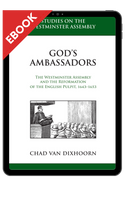
EBOOK Unity and Continuity in Covenantal Thought: A Study in the Reformed Tradition to the Westminster Assembly
- Affordable shipping (free $100+)
- 100,000+ customers served
- "Wonderful books, great prices, awesome customer service." – Ivan, IL
Description
Over the years, some scholars have argued for competing streams of covenantal thought within the reformed tradition. For instance, some have pitted Calvin against the Calvinists, some have tried to detect unilateral and bilateral approaches to the covenant, and still others have set federalism against predestinarianism. In this landmark survey of covenant theology, Andrew a. Woolsey assesses the reformed tradition and finds that the development of diverse formulas actually maintained substantial agreement on the basic contours of covenantal thought.
Unity and Continuity in Covenantal Thought examines the historiographical problems related to the interpretation of the Westminster Standards, delving into the issue of covenantal thought in the Westminster Standards, followed by an exhaustive analysis of nineteenth- and twentieth-century scholarship on covenant. After surveying patristic and medieval backgrounds, Woolsey’s study looks in detail at a representative list of writers who contributed to the early development of federal thought (Luther, Oecolampadius, Zwingli, Bullinger, Calvin, and Beza). The final part of his study explores the early orthodox approach to covenant and the rise of emphasis on the covenants of works and grace in the thought of Heidelberg theologians (Ursinus and Olevianus), the English Puritans (Cartwright, Fenner, and Perkins), and Scottish divines (Knox, Rollock, and Howie). Here is a substantial contribution to the study of reformed thought on covenant from its reformation origins to the more detailed formulations of the early to mid-seventeenth century.
Contents
Foreword
Acknowledgments
Abbreviations
Introduction
Part One: Setting the Scene
1. Historical Background to the Westminster Assembly
2. Sources and Covenant Doctrine of the Westminster Standards
3. Historiography of Covenantal Thought: The Nineteenth Century
4. Historiography of Covenantal Thought: The Twentieth Century
Part Two: Forerunners
5. The Covenant in the Church Fathers
6. The Covenant in Medieval Thought
7. The Covenant in the Early Reformers
Part Three: The Genevan Influence
8. John Calvin on the Unity of the Covenant
9. John Calvin on Covenant, Law and Grace
10. John Calvin on Covenantal Conditions
11. John Calvin on Covenant and Predestination
12. John Calvin: Conclusion
13. Theodore Beza and the Covenant
Part Four: Post-Reformation Development
14. The Heidelberg Story: Zacharius Ursinus
15. The Heidelberg Story: Caspar Olevianus
16. The Puritan Stream: Thomas Cartwright and Dudley Fenner
17. The Puritan Stream: William Perkins
18. The Scottish Connection: John Knox
19. The Scottish Connection: Robert Rollock and Robert Howie
20. Conclusion
Bibliography
Index
Endorsements
“The appearance of Andrew Woolsey’s unity and Continuity in Covenantal Thought marks a significant juncture in the study of the development of early modern reformed theology. Woolsey’s dissertation, completed in 1988, is the first (and after more than two decades, remains the only) major attempt in English to present a view of the movement of reformed thought on covenant from its reformation origins to the more detailed formulations of the early to mid-seventeenth century. This fact alone identifies the importance of the publication of Woolsey’s work.”
—Richard A. Muller, P. J. Zondervan Professor of Historical Theology, Calvin Theological Seminary
“Unity and Continuity in Covenantal Thought is an important contribution to the history and historiography of covenant theology. Just as Richard Muller (in Christ and the Decree and his subsequent research) exploded the prevalent ‘Calvin versus the Calvinists’ brand of historiography in tracing the transmission of the reformation into the post-reformation era, so also Andrew Woolsey demonstrates, as the title of this book indicates, the continuity in the development of covenant theology in the sixteenth and seventeenth centuries. His review of the historiographical literature is unmatched and comprehensive, which alone makes this work indispensable to students and scholars in the fields of reformation and post-reformation studies. His articulation and analysis of the theological issues involved are skillful, specific, and sympathetic. No future thesis in this area of study can afford to ignore this work. It is now the gold standard—providing a whole series of unique features. Among them, Woolsey provides a competent introduction to the patristic roots of reformed covenantal thought. He shows the complementarity of Bullinger’s and Calvin’s covenant theology. and he provides an original and crucial treatment and evaluation of the oft but wrongly maligned Beza, outlining Beza’s continuity with Calvinian covenant thought and thus debunking the idea that covenant theology was a reaction against Bezan ‘high Calvinism.’ Welcome to the treasure trove of covenantal thought!”
—Ligon Duncan, Senior Minister, First Presbyterian Church, Jackson, Mississippi, and John E. Richards Professor of Systematic and Historical Theology, Reformed Theological Seminary
About the Author
Andrew A. Woolsey served as minister of the evangelical Presbyterian Church in Crumlin, N. Ireland for nineteen years.





